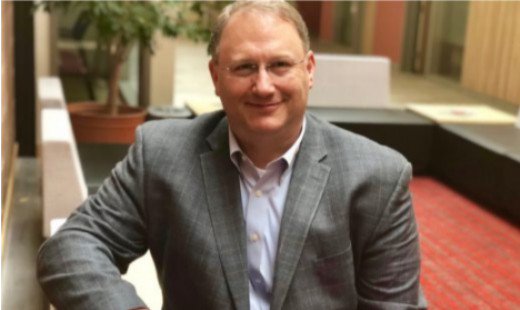No one could give him a definitive answer, which made him begin to ponder: how we can carry a phone in our pocket that can tell us just about anything we need to know, yet no one can determine if his son suffered a
concussion.
“I’m a naturally curious person,” Rich stated, which is what led him to begin looking into concussion research. He was shocked at how little there was out there to help athletes and coaches determine whether someone had a concussion, and what did exist was too subjective for his liking—the market needed an objective tool.
This would lead Rich out of retirement to begin a research company of his own that would dig deeper into concussions and begin working on a device to be used to track changes in an athlete’s balance and reaction time. He would also begin studying saliva and its connection to being able to not only detect concussion, but also determine how long it will likely take the person to recover.
Rich joked, “I’m easily bored,” when I asked him how difficult was the decision to leave retirement and go back to working long hours. His passion to help prevent concussions, and to help those struggling with lingering symptoms get the help they need, is evident. “I’m doing all of this for my son,” he added.
“I’m one of those people who love a challenge and love to learn, so diving head-first into this (sorry about the pun!) was just part of who I am. At this point, I feel like everything I’ve done previously was just a prelude and training ground to prepare me for the triumphs and struggles associated with building what is now Quadrant Biosciences.”
Realizing early on that our work had the potential to improve the lives of so many children and adults certainly added a sense of urgency to our mission,” Rich said. It began with an idea of putting a device into helmets to track concussive hits, but he quickly knew it wouldn’t provide the answers. “Collisions can’t provide an objective diagnosis,” Rich said.
He knew they wanted to provide physicians with the best tools to acquire the data necessary to make objective decisions, and also to make it patient-friendly so they can access their data from anywhere in the world. For instance, if an athlete switched schools or states, his or her data would be easily available to a new physician.
In March 2012, Rich self-funded Motion Intelligence, which would later become Quadrant Biosciences. In 2013, Quadrant had connected with SUNY Upstate Medical University, and in 2015 moved its office onto campus in the Institute for Human Performance building. Collaborating with the Upstate Concussion Clinic, Motion Laboratory, Neuroscience, and the Molecular Analysis Core Facility at SUNY, Rich and his team created a product called ClearEdge. ClearEdge includes FDA- cleared computerized tests and a cloud-based system for storage and retrieval of the test results, and it was launched for sale in August 2017.
The ClearEdge Brain Health Toolkit provides a new standard of care that offers clinical best practices with cloud-based analytics. The ClearEdge Toolkit offers clinicians a suite of testing applications that have the following desirable characteristics:
Complete — ClearEdge provides clinicians a suite of tests and assessments to establish baselines and track brain health and wellness over time. The toolkit is comprised of separate tests for cognitive efficiency, balance assessment, and symptoms tracking.
Objective — Patient test results are quantitatively analyzed relative to prior performance.
Reliability — The test-retest reliability of the cognitive and balance tests enable clinicians to identify changes in a patient’s performance that exceed the normal range of variability.
Evolutionary — Academic research is translated to clinical practice.
Cost-Effective — The system’s low cost of acquisition and short testing interval (approximately 20 minutes) facilitates time-and-revenue efficiencies using existing CPT codes.
Portable — The entire system fits in a briefcase; ClearEdge testing can be done almost anywhere.
Additionally, Rich’s team has also focused a lot of effort on developing a saliva test that may be used in the future to detect a concussion. There has been a big push by researchers to find a reliable biomarker test to objectively diagnose a concussion, but thus far it has remained elusive. However, the research Quadrant is conducting in cooperation with Penn State College of Medicine and SUNY Upstate Medical University may change that. Focusing on sampling patients’ saliva, a set of micro RNAs have been identified that are present in significantly different amounts in patients with a con-cussion versus normal patients.
Among the significant findings of this research include:
Saliva, a Rich Source – MicroRNAs have been found in relative abundance in the saliva which, when coupled with their unique epigenetic properties, make them attractive biomarker candidates.
Accurate Differentiation – Six microRNAs had parallel changes in CSF and saliva, and could accurately separate concussion and control cases.
Predictive of Symptom Duration – The study also showed compelling data that this biomarker may be a better predictor of symptom (headache, fatigue, difficulty concentrating, etc.) duration than current standard concussion assessments.
Results of this research were presented at the 2017 Pediatric Academic Societies meeting in San Francisco and published in the highly regarded medical journal, JAMA Pediatrics.
I was fortunate to meet Rich and his team in Syracuse, New York, after Motion Intelligence President, Chrys Chrysanthou, reached out to me after reading my story on HuffPost and introduced me to the research and development that Quadrant was doing.
When I sat down with Rich, I was immediately drawn to his passion to find a solution—which rivaled my own passion for advocacy. He told me, “I see us making a difference. If we do that, then we’ve done it right!” Rich and his team are dedicated to finding objective solutions, and strive to meet the gold standard of quality. The entire team is passionate about finding answers and providing tools that will help diagnose and give patients a sense of understanding. He started this journey out of an effort to help his son, but every other individual who sustains a concussion will benefit from his passion.
He concluded by stating, “Quadrant Biosciences is an incredible group of people from very diverse backgrounds. Every day, I’m humbled by their intellect and ability to innovate. I’m old enough to know how special this company is, and what a privilege it is to work with everyone here!”


